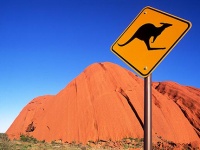Visit worldtravels.com for the full guide to Australia. Build a complete Australia travel guide and email to your clients - sign up for a trial subscription of World Travels Pro.
Australia

Australia is the sixth largest country in the world - more or less the same size as mainland USA. This vast land however also has the lowest population density in the world, with only two people per square kilometre.
Australia is politically divided into six states and two territories, each one offering a different experience for the traveller. There is the drama of the remote 'Outback', the colourful spectacle of the Great Barrier Reef and its coral islands, the excitement of the cosmopolitan cities, the sun and surf at some of the best beaches in the world, and the tropical rainforests of Western Australia. The list is endless in this diverse land of adventure, which boasts 2,000 national parks and 14 World Heritage-listed areas, along with more than 7,000 beaches.
Australia is a land of character too, with its melting pot of cultures. For more than 50,000 years the Aboriginal people lived and thrived in the continent's unique environment. It is believed the Aboriginals are the world's oldest civilisation, and in recent years there has been a resurgence of interest in keeping the Aboriginal culture alive and flourishing.
The vast continent at the bottom of the world was the last landmass to be discovered by European explorers. Captain James Cook arrived in Botany Bay in 1770 and sparked off generations of emigration to Australia, which for some time served as a penal colony. It was not until 1860 that two explorers - Robert Burke and William Wills - became the first Europeans to cross Australia from south to north. The country remains a magnet for modern explorers and adventurers and has a great deal to offer tourists and holidaymakers.
Climate
Australia is temperate, most of the country receiving more than 3,000 hours of sunshine a year. In summer (December to March) the average temperature is 84°F (29°C). The hottest region is the northern two-thirds of the continent, which experiences humid and wet conditions in summer. Further south summer is warm with occasional hot spells and mild nights. Winter (June to August) averages 56°F (13°C) for the country as a whole, with warm days and mild nights in the northern areas, becoming cool and showery in the south (although there are still plenty of sunny days).
Money
The Australian Dollar (AUD) is divided into 100 cents. Banks and bureaux de change exchange most foreign currencies. Travellers cheques are also welcome everywhere, but banks take a small commission and it is better to take cheques in major currencies (e.g. US dollars or Euros) to avoid additional charges. Credit cards are widely accepted and ATMs are freely available throughout the country. Banking hours are generally 9.30am to 4pm Monday to Thursday, and 9.30am to 5pm on Friday, but some banks offer extended hours and some are open on Saturday mornings.
Passport Visa
An ETA is an electronically issued and verified visa, not visible in a passport. ETAs are issued to passengers travelling for tourist or business purposes. Tourist ETAs are valid for three months. ETAs are obtainable online at: www.eta.immi.gov.auor through most travel agents.
Entry Requirements
- US nationals must have a valid passport for intended period of stay. Visa required, except for those with Electronic Travel Authority (ETA).
- UK nationals must have a passport valid for intended period of stay. Visa required, except for those with Electronic Travel Authority (ETA).
- Canadian nationals require a passport valid for intended period of stay. Visa required, except for those with Electronic Travel Authority (ETA).
- South African nationals must have a passport valid for the duration of the stay. A visa is required.
- Irish nationals must have a passport valid for the intended period of stay. Visa required, except for those with Electronic Travel Authority (ETA).
- New Zealanders require a valid passport on entry to Australia. A Special Category Visa (SCV) is issued on arrival after completing a passenger card.
Health
A yellow fever vaccination certificate is required by travellers over one year of age arriving within six days of having stayed overnight or longer in an infected country. No other special immunizations or medications are required for most trips to Australia, however insect repellents are strongly advised because of the risk of Murray Valley encephalitis, Ross River virus infections, dengue fever and other mosquito-borne illnesses. Another health risk is sunburn, and visitors are advised to take precautions. Medical services are excellent, but can be expensive so travellers should ensure that they have adequate insurance. Australia has a reciprocal health agreement with the United Kingdom providing for free hospital emergency medical treatment; proof of UK residence is required.
Embassy Consulates
- Embassy of Australia, Washington DC, United States: +1 202 797 3000.
- Australian High Commission, London, United Kingdom: +44 (0)20 7379 4334.
- Australian High Commission, Ottawa, Canada: +1 613 236 0841.
- Australian High Commission, Pretoria, South Africa: +27 (0)12 423 6000.
- Australian Embassy, Dublin, Ireland: +353 (0)1 664 5300.
- Australian High Commission, Wellington, New Zealand: +64 (0)4 473 6411.
Foreign Embassies
- Embassy of the United States, Canberra: +61 (0)2 6214 5600.
- British High Commission, Canberra: +61 (0)2 6270 6666.
- Canadian High Commission, Canberra: +61 (0)2 6270 4000.
- South African High Commission, Canberra: +61 (0)2 6272 7300.
- Embassy of Ireland, Canberra: +61 (0)2 6273 3022.
- New Zealand High Commission, Canberra: +61 (0)2 6270 4211.







